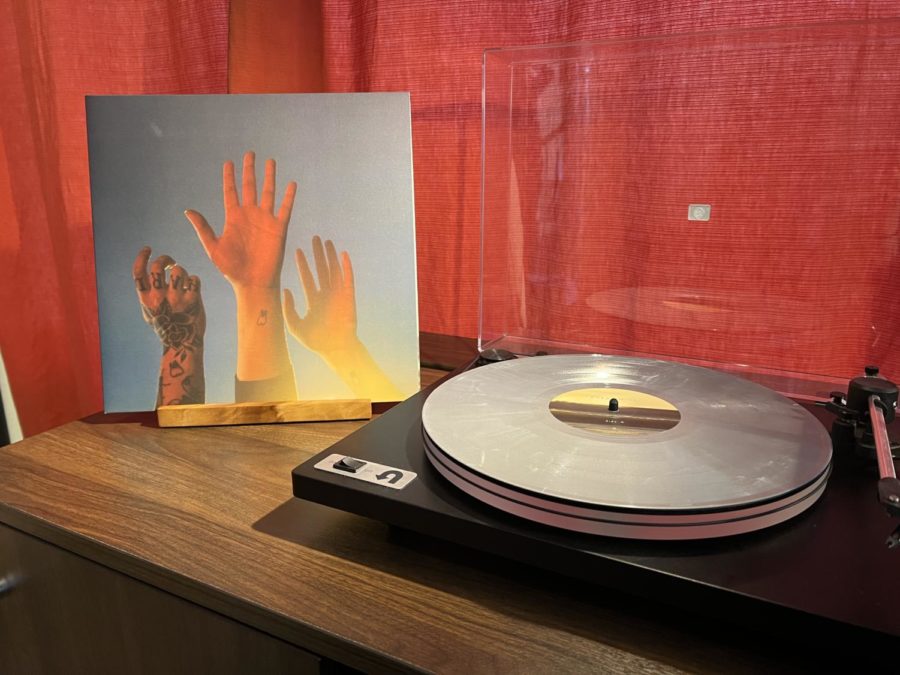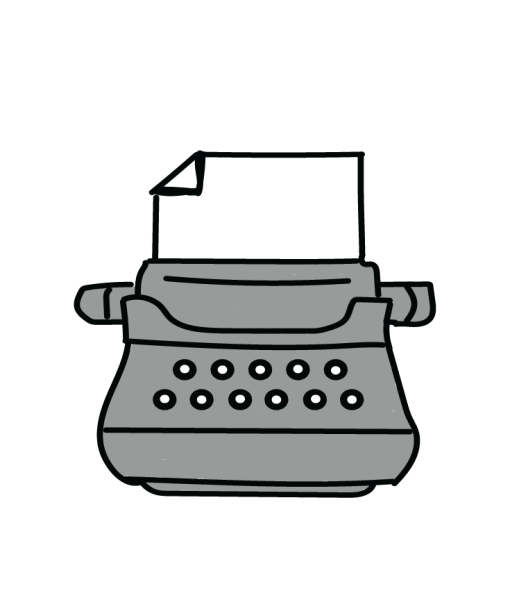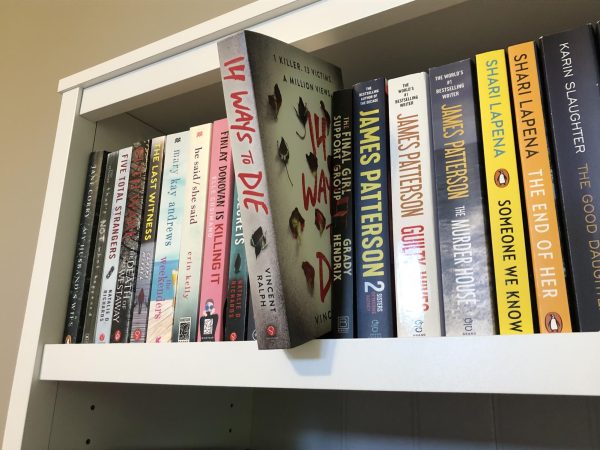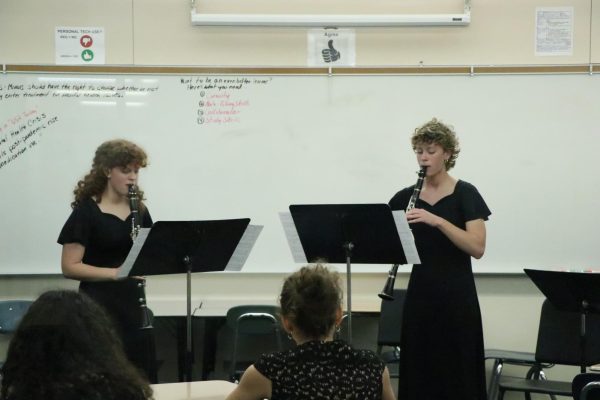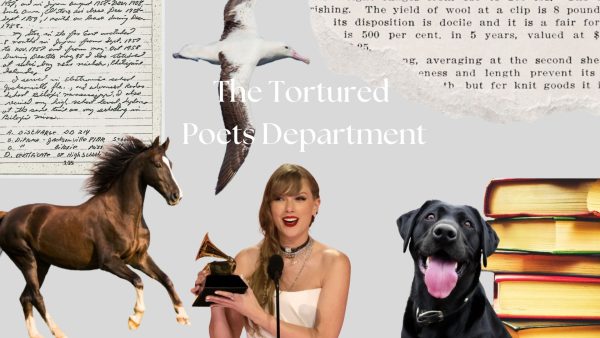Tried and true blue
boygenius’ debut album maintains high standards.
The members of boygenius show off their matching tattoos on the cover of “the record.”
Following a five-year hiatus, Julien Baker, Phoebe Bridgers, and Lucy Dacus’ supergroup boygenius re-enter the musical canon with an unforgettable debut album entitled “the record,” released March 31. While their debut self-titled EP finds Baker, Bridgers, and Dacus in a state of self-discovery and introduction to one another, “the record” hinges on their connections to each other and the band, as well as to the fanbase they have generated over the years. In its entirety, “the record” is boygenius’ tribute to their paramours, new lovers, and each other more than anything.
The singles
“the record” was announced in mid-January, along with a premier of three lead singles, “$20,” “Emily, I’m Sorry,” and “True Blue.” These songs demonstrate what boygenius does best— support each other. Each member is highlighted in one song, showcasing their distinct style and lyricism while also reminding listeners why the trio works so well.
“$20” is a standout single, featuring Baker’s distinct lyricism and indie-rock style. Seeped in themes of desolation and broken dreams, Baker attempts to maintain a sense of peace amidst the chaos. The lyrics “Pushing the flowers that come up/ Into the front of a shotgun,” references Bernie Boston’s 1967 photo, “Flower Power,” in which a Vietnam war protester places flowers into the guns pointed at him by a police force. In the song, Baker attempts to hinder an impending breach in the momentary serenity, just as the man in the photo attempts to broach peace amid global tension. The song maintains a steady rhythm on the brink of destruction until the pivotal moment where the tension breaks. Bridgers sings in the background, building to her final belt of, “I know you have twenty dollars.” While Baker shows a slow, quiet dissension into hopelessness, Bridgers grows angry, telling a multitudinous story.
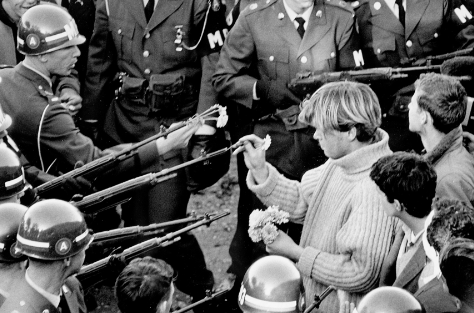
Bridgers takes center stage on the second single, “Emily, I’m Sorry,” a demure and regretful apology to a past partner. This track carries on the motif of dreams from “$20” and creates a juxtaposition between the line “She’s asleep in the backseat/ Looking peaceful enough to me/ But she’s wakin’ up inside a dream,” to “Headed straight for the concrete/ In a nightmare, screaming/ Now I’m wide awake, spiraling.” While Bridgers is disrupted in a current nightmare and cannot sleep, “she” is haunted by it in her dreams. Similarly to “$20,” “Emily, I’m Sorry,” builds up to a breaking point where the story cracks and Bridgers is faced with the reality of her situation. Bridgers sings of uncertainty and of knowing that this apology is past-due, and she does so with a beautiful simplicity.
“True Blue” highlights the songwriting and style of Dacus, and feels like a deep cut from her 2021 album “Home Video.” Dacus uniquely uses her songs as love letters to her history— both that of her past self and her past lovers. In the first verse, Dacus croons, “You say you’re a winter b***h/ But summer’s in your blood/ You can’t help but become the sun.” Time has bathed this person in a golden glow in Dacus’ eyes and she wants to remember them that way. Eventually, however, the lyrics begin to reveal a buried tension rooted in events from the past. In the final verse, Dacus gives readers a glimpse into the tension, singing, “You’ve never done me wrong, except for that one time/ That we don’t talk about/ Because it doesn’t matter anymore/ Who won the fight? I don’t know/ We’re not keeping score.” The song showers its subject with love and scrutiny, wishing them the best in their current life and missing who they were in the past. This sense of eternal and unconditional love carries into other Dacus-led tracks on “the record.”
These tracks are an outstanding reintroduction to the supergroup that usher listeners into the group’s new era. With just four tracks, it’s clear that “the record” promised to be sonically divorced from the “boygenius” EP. The finished product proves that this record is a product of boygenius’ love and dedication to their craft, making it impossible for listeners to not love it just as much.
The album
“the record” opens with an acapella performance in “Without You Without Them.” Dacus leads her bandmates in an unassuming dedication to each other and their fans. When played in conjunction with “Ketchum, ID” from their first EP, “Without You, Without Them” ties the projects together while escorting listeners into something new. In it, boygenius asks, “Who would I be without you, without them?” The “you” is a breaking-the-fourth-wall moment to fans, while the “them” is the other members. They acknowledge these two elements that brought them to this point.
Who would I be without you, without them?
— boygenius
Several songs from “the record” are tied together by a sense of unconditional love. “Satanist” shows each member asking someone if they will be a satanist/anarchist/nihilist with them. Each member chose a personal interest or belief system and wrote their verses around it. While each verse is unique to its writer, the sentiment is the same. They just want someone to stay with them through every “seismic shift” they undergo. “We’re In Love,” a nearly five-minute song, maintains this theme of unconditional love. The song was mainly written and performed by Dacus as a love letter to her bandmates. Her stylistic songwriting shines through yet again with the thoughtful observance of her bandmates and everlasting love for them. The line “I could go on and on and I will,” is not only a subtle nod to Taylor Swift’s “This Love” but also carries a double meaning. She could talk for hours about how much she loves Baker and Bridgers and she could also continue to love them forever, no matter what happens.
While most songs on “the record” excel as parts of the whole and individual tracks, “Leonard Cohen,” falls flat. Named after the famous Canadian singer/songwriter whose song “Anthem” is sampled on the track, the song shows Dacus reflecting on a memory where Bridgers distractedly drove an hour in the wrong direction with her and Baker. Like the story Dacus is reciting, this song feels like a detour in the album, though not a terribly valuable one. The lyrics feel weak compared to what Dacus has proven herself capable of and the song gets lost amongst the others.
“Letter To An Old Poet” closes the album as an embodiment of the self-reflection that the members underwent in the conception of this album, with the idea of it stemming from a group therapy session. The title references Rainer Maria Rilke’s “Letters to a Young Poet,“ a collection of correspondences between Rilke and Franz Xaver Kappus. Across ten letters, Rilke teaches Kappus to compose and appreciate poetry, and, over the course of these letters, Rilke reflects on his young self. The song sees Bridgers reflecting on her past, where she previously found herself in a love that ultimately let her down. Now, she sees how toxic the situation was for her, and she is ready to move on once she has said her peace.
The bridge and outro interpolate the group’s 2018 track, “Me & My Dog,” with both songs predominantly written and sung by Bridgers. In the bridge, Bridgers sings “I wanna be happy/ I’m ready to walk into a room without lookin’ for you/ I’ll go to the top of our building/ And think of my dog when I see the full moon,” changing the lyrics from “Me & My Dog,” where she sings, “I wanna be emaciated/ I wanna hear one song without thinking of you/ I wish I was on a spaceship/ Just me and my dog and an impossible view.” Bridgers has grown in herself and her relationships, and she is no longer willing to harm herself for the sake of others. The slight hesitation before the word “happy” in the updated bridge shows Bridgers in another moment of uncertainty, but she dives in nonetheless. The outro samples an audience cheering from the band’s 2018 Brooklyn Steel performance, which Baker cited as a ‘we made it’ moment for the group in an interview with Them. “Letter To An Old Poet” is the perfect closing track to “the record” as it also closes the chapter on boygenius’ early days. With this album, they have established themselves in the music industry and are ready to move beyond the starting line.
The record
Alongside the global debut of “the record,” boygenius released “the film,” a 14-minute short film highlighting the lead singles. Directed by Kristen Stewart, “the film” portrays the exhaustive and formidable task of growing up, apologizing, and moving forward. We see the members as younger versions of themselves moving through their lives until they become their current-day selves.
“the record” is a beautifully complex and thoughtful examination of adolescence and adulthood through tumultuous shifts and devastating loss. Baker, Bridgers, and Dacus are a dream team of songwriting, production, and presentation, and their unique talents in lyrics range from heartfelt and crushing to sarcastic and deadpan. Alongside “the film,” which features each lead single, “the record” portrays the exhaustive and formidable task of growing up, apologizing, and moving forward. We see the members as younger versions of themselves in both pieces as they morph into their current-day selves. It is a standout debut and an enticing glimpse at what is to come from boygenius in the future.
Rating: 9.5/10
Your donation will support the student journalists of West Linn High School. Your contribution will allow us to continue to produce quality content by purchasing equipment, software, and continuing to host our website on School Newspapers Online (SNO).

Lily Gottschling, senior, is the Copy Editor-in-Chief for wlhsNOW.com. She loves writing reviews, features, and opinions. She is also a co-host of the...


























![Game, set, and match. Corbin Atchley, sophomore, high fives Sanam Sidhu, freshman, after a rally with other club members. “I just joined [the club],” Sidhu said. “[I heard about it] on Instagram, they always post about it, I’ve been wanting to come. My parents used to play [net sports] too and they taught us, and then I learned from my brother.”](https://wlhsnow.com/wp-content/uploads/2024/03/MG_7715-2-1200x800.jpg)





![The teams prepare to start another play with just a few minutes left in the first half. The Lions were in the lead at halftime with a score of 27-0. At half time, the team went back to the locker rooms. “[We ate] orange slices,” Malos said. “[Then] our team came out and got the win.”](https://wlhsnow.com/wp-content/uploads/2023/10/IMG_2385-1200x800.jpg)





![At the bottom of the third inning, the Lions are still scoreless. Rowe stands at home plate, preparing to bat, while Vandenbrink stands off to the side as the next batter up. Despite having the bases loaded, the team was unable to score any runs. “It’s just the beginning of the season. We’re just going to be playing out best by June, [and] that’s where champions are,” Rowe said.](https://wlhsnow.com/wp-content/uploads/2024/03/IMG_3077-1200x900.jpg)



































































